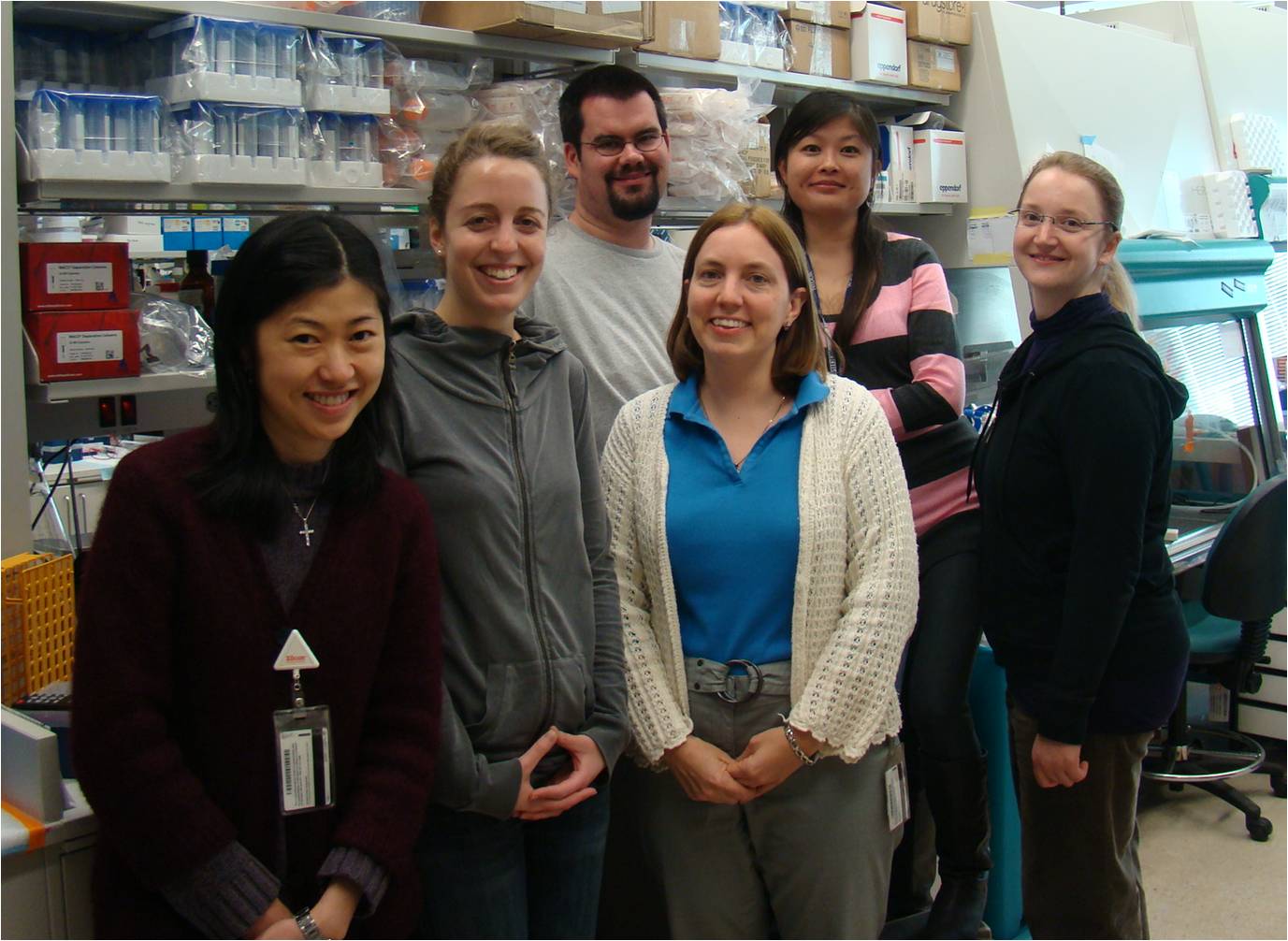Kristin Tarbell, Ph.D.
IMMUNE TOLERANCE SECTION
NIDDK, National Institutes of Health
Building 10-CRC
, Room 5-5940
10 Center Dr.
Bethesda, MD 20814
Tel: 301-451-9360
Fax: 301-480-4518
Email: tarbellk@mail.nih.gov
|

|
Education / Previous Training and Experience:
B.A., Cornell University, 1995
Ph.D., Stanford University, 2002
Research Statement:
Our research focuses on the role of dendritic cells (DCs) and regulatory T cells (Tregs) in peripheral T cell tolerance induction, and how these mechanisms are altered or deficient in an autoimmune setting. Dendritic cells are specialized antigen presenting cells that help determine the type of immune response that develops. Regulatory T cells are a subset of CD4 T cells that can inhibit immune responses and help induce tolerance.
Specifically, we are studying immune tolerance in the NOD mouse, a model of type 1 diabetes: a human T cell-mediated organ specific autoimmune disease in which overactive T cell responses to self antigens expressed in the pancreatic islets cause destruction of insulin-producing beta cells. We have also recently initiated some studies of immunomodulation in human peripheral blood cells.
One long-term goal of my research is to learn how to use DCs to induce autoantigen-specific tolerance for treatment of human type 1 diabetes.
Below are outlined some of the areas on which we are now focusing:
Use of steady state DC to enhance tolerance via anergy or deletion:
If antigen is presented in the context of inflammatory signals such as toll-like receptor ligands, DCs can be activated and the result is immunity, but if antigens are presented to T cells in the absence of such signals, i.e. “steady state”, tolerance results. However, little is known about how this type of tolerance is altered in autoimmune individuals, and if it is possible to induce steady state tolerance in the environment of chronic autoimmune inflammation.
In order to study DC-mediated steady state tolerance in the context of autoimmunity, we are targeting islet autoantigens directly to DCs in vivo via antibodies against endocytic recptors expressed by DCs. In vivo targeting allows one to study dendritic cell function without isolating the DCs, a process that can alter the maturation-state of the DCs. We are now comparing the effects of targeting autoantigens to CD8 and CD11b cDCs as well as pDCs.
Plasmacytoid Dendritic Cells (pDCs) in NOD mice
pDCs are a rare subset of dendritic cells that produce IFN-alpha in response to innate immune signals, but can also present antigen like conventional DCs. Published reports on the role of pDCs in autoimmunity are mixed. IFN-alpha production can be pro-inflammatory, yet pDCs can also play a tolerogenic role by, for example, inducing Tregs. We are now measuring pDC function in NOD mice compared to control strains.
The role of IL-2 for DC development and function.
IL-2, a susceptibility gene for both mouse and human autoimmune diabetes, is important for maintaining immune tolerance via effects on regulatory T cells. However, little is known about how IL-2 affects DCs. We have shown that NOD mice, which have lower IL-2 levels compared to non-diabetic control strains, have higher numbers of pDCs in the spleen. We then found that IL-2 inhibits both pDC and cDC development by using in vitro cultures of bone marrow cells stimulated to differentiate with the growth factor Flt3L. Furthermore, DCs developed in the presence of IL-2 displayed decreased ability to stimulate T cells. Our results show that IL-2, in addition to affecting lymphocytes, can modulate DC development and function.
Immune effects of Sitagliptin in healthy volunteers.
I have an active clinical protocol designed to understand what changes to immune function occur after exposure to the diabetes drug sitagliptin, an inhibitor of dipeptidyl peptidase 4 (DPP-4), also called CD26. Because sitagliptin may increase beta cell mass, studies to test the use of sitagliptin in type 1 diabetes are underway. But DPP-4 inhibitors such as sitagliptin may also affect immune cells. In addition to cleaving incretins that regulate blood glucose, DPP-4 cleaves chemokines and is expressed on leukocytes where it can act as a costimulatory molecule. Mouse studies suggest that inhibition of DPP-4 increases TGF-beta levels and blocks autoimmunity. In this study, we are looking broadly at human immune function in people taking sitagliptin for 1 month. Readouts include gene expression profiling, plasma cytokine levels, flow cytometric analysis of PBMC subsets, and measurement of proliferation and cytokine production after in vitro stimulation.
Lab Group

Tarbell lab group Dec 2010.
From left Angel Li, Grace Linder, Jeff Price, Kristin Tarbell, Annie Kilby, and Cosima Kretz.
Selected Publications:
1) Y. Belkaid and K.V.Tarbell, Arming Treg Cells at the Inflammatory Site, Immunity 2009, V30, p322-323.
2) Y. Belkaid and K. Tarbell, Regulatory T cells in the Control of Host-Microorganism Interactions, Ann. Rev. Immunol. 2009 Vol. 27: 551-589.
3) A. Mukhopadhaya, T. Hanafusa, I. Jarchum, Y. Chen, Y Iwai, D.V. Serreze, R. M. Steinman, K. V. Tarbell, and T. P. DiLorenzo. Selective delivery of β cell antigen to dendritic cells in vivo leads to deletion and tolerance of autoreactive CD8 T cells in NOD mice. Proc Natl Acad Sci U S A. 2008. V105 p6374-6379.
4) X. Luo*, K. V. Tarbell*, H. Yang, K. Pothoven, S. L. Bailey, R. Ding, R. M. Steinman and M. Suthanthiran. Dendritic cells with TGF-β1 differentiate naïve CD4 CD25- T cells into islet-protective Foxp3 regulatory T cells * equal authorship. Proc Natl Acad Sci. USA 2007 Feb 20; 104(8): 2821-6.
5) K. V. Tarbell, L. Petit, X. Zuo, P. Toy, X. Luo, A. Mqadmi, S. Yamazaki, S. Mojsov, R. M. Steinman. Dendritic cell-expanded, islet-specific, CD4 CD25 CD62L regulatory T cell restore normoglycemia in diabetic NOD mice. J. Exp. Med. 2007 204: 191–201.
6) S.Yamazaki , K. Inaba, K. V.Tarbell, R. M. Steinman. Dendritic cells expand antigen-specific Foxp3 CD25 CD4 regulatory T cells, including suppressors of alloreactivity. Immunol. Rev. 2006 Aug; 212:314-329.
7) K.V. Tarbell, S. Yamazaki , R. M. Steinman. The interactions of dendritic cells with antigen-specific, regulatory T cells that suppress autoimmunity. Semin. Immunol. 2006 Apr;18(2):93-102.
8) S. Yamazaki, M. Patel, A. Harper, A. Bonito, H. Fukuyama, M. Pack, K.V. Tarbell, M. Talmor, J.V. Ravetch, K. Inaba, R.M. Steinman. Effective expansion of alloantigen-specific Foxp3 CD25 CD4 regulatory T cells by dendritic cells during the mixed leukocyte reaction. Proc Natl Acad Sci U S A. 2006 Feb 21;103(8): 2758-63.
9) E. L. Masteller, M.R. Warner, Q. Tang, K.V. Tarbell, H. McDevitt, J.A. Bluestone. Expansion of functional endogenous antigen-specific CD4 CD25 regulatory T cells from nonobese diabetic mice. J Immunol. 2005 Sep 1;175(5):3053-9.
10) E. A. Ranheim, K. V. Tarbell, M. Krogsgaard, V. Mallet-Designe, L. Teyton, H.O. McDevitt, and I. L. Weissman. Selection and Function of Aberrant Class II Restricted CD8 T Cells in NOD Mice Expressing a Glutamic Acid Decarboxylase (GAD)65-specific T Cell Receptor Transgene. Autoimmunity. 2004 Dec;37(8):555-67.
11) S. Kim*, K. V. Tarbell*, M. Sanna, M. Vadeboncoeur, T. Warganich, M. Lee, M. Davis and H. O. McDevitt. Prevention of type I diabetes transfer by glutamic acid decarboxylase 65 peptide 206-220-specific T cells. Proc Natl Acad Sci U S A. 2004 Sep 28;101(39):14204-9. * equal authorship.
12) K. V Tarbell, S. Yamazaki, K. Olson, P. Toy, R. M. Steinman. CD25 CD4 T cells, expanded with dendritic cells presenting a single autoantigenic peptide, suppress autoimmune diabetes. J. Exp. Med. 2004 199: 1467-1477.
13) S. Yamazaki, T. Iyoda, K. Tarbell, K. Olson, K. Velinzon, K. Inaba, and R. M. Steinman. Direct Expansion of Functional CD25 CD4 Regulatory T Cells by Antigen-processing Dendritic Cells. 2003 J. Exp. Med.,198: 235 - 247.
14) K. V. Tarbell, M. Lee, E. Ranheim, C. C. Chao, M. Sanna, S. Kim, P. Dickie, L. Teyton, M. Davis, and H. O. McDevitt. CD4 T Cells from Glutamic Acid Decarboxylase (GAD)65-specific T Cell Receptor Transgenic Mice Are Not Diabetogenic and Can Delay Diabetes Transfer. J. Exp. Med., Aug 2002; 196: 481 - 492.
15) S. Hsieh, N. Chen, K. Tarbell, N. Liao, Y. Lai, K. Lee, K. Lee, S. Wu, H. Sytwu, S. Han, and H. McDevitt. Transgenic Mice Expressing Surface Markers for IFNγ and IL-4 producing Cells Molecular Immunology. 37 (2000) 281-293.
Update My page
Page last updated: December 23, 2010